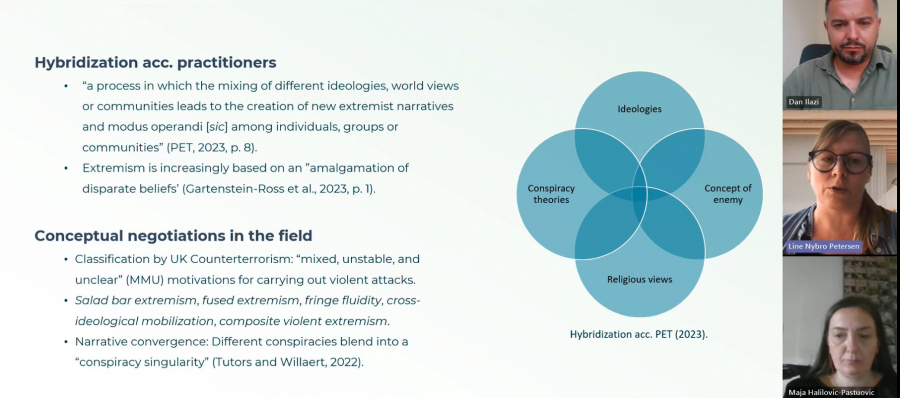3/07/2024

Prishtina, June 27, 2024 – The Kosovar Centre for Security Studies (KCSS) hosted an insightful webinar as part of the Horizon Europe research project, SMIDGE (Social Media Narratives: Addressing Extremism in Middle-Age). The webinar, titled "Tackling Religious Radicalization among Middle-Aged Adults in the Digital Era," featured expert discussions on the susceptibility of individuals aged 45-65 to extremist narratives and strategies to counteract this trend.
Speakers of the webinar included, Dr Line Nybro Petersen of the University of Copenhagen, Dr James Fitzgerald, Associate Professor in Security Studies at the School of Law and Government, Dublin City University (DCU), Dr Maja Halilovic-Pastuovic, Research Assistant Professor at the School of Religion, Theology, and Peace Studies in Trinity College Dublin (TCD), and Dr Moinuddin (Moign) Khawaja, a Government of Ireland-Irish Research Council Postdoctoral Fellow at the Dublin City University (DCU), and Lejdi Dervishi, National Coordinator for Countering Violent Extremism, in the Albanian Government.
Dr. Line Nybro Petersen introduced the concept of "Spaces of Hybridized Prefatory Extremism (HYPE)", highlighting the nuanced ways extremist ideologies manifest online and interact with each other, in a manner where different forms of extremism are connected. Dr. Moign Khawaja analyzed how ISIS manipulated children's portrayals in propaganda. Dr. Maja Halilovic-Pastuovic examined religious radicalization in post-conflict Bosnia, emphasizing, "Ethnic, religious, and political extremism intersect within societal frameworks, evolving beyond individual paths." Her research in the Western Balkans provided critical insights into the complexities of radicalization.
Dr. James Fitzgerald discussed the proliferation of conspiracy theories during crises, noting, the integration of conspiracy movements like QAnon into mainstream politics, likening them to religious movements. Dr Fitzgerald also warned of the epistemic trap, that if we look for signs of radicalization we might always find them.
Lejdi Dervishi highlighted Albania's efforts in countering violent extremism, emphasizing the challenges of institutional coordination and policy development. "Involving civil society is crucial for reintegration and psychosocial support," she stated, underscoring the importance of a comprehensive approach.
The webinar provided valuable perspectives on combating religious radicalization, emphasizing the need for multi-sectoral strategies to effectively counter extremism.